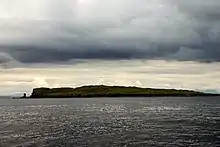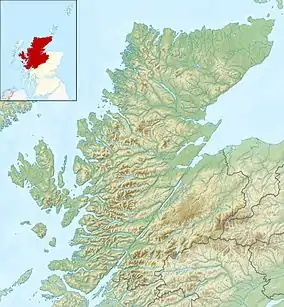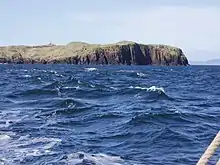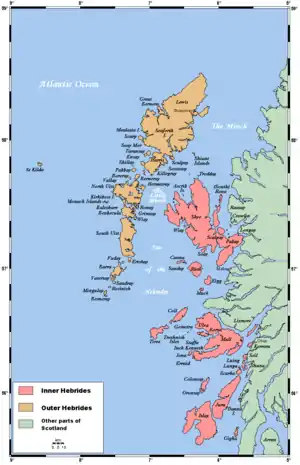Eilean Trodday
Eilean Trodday is an island in The Minch just off the north coast of the Trotternish peninsula of Skye in Scotland.[2][3]

| Scottish Gaelic name | Eilean Trodday |
|---|---|
| Meaning of name | island of the trolls |
| Location | |
 Eilean Trodday Eilean Trodday shown within Highland Scotland | |
| OS grid reference | NG440789 |
| Coordinates | 57.727°N 6.300°W |
| Physical geography | |
| Island group | Skye |
| Area | 38 ha[1] |
| Highest elevation | 45 m[2] |
| Administration | |
| Sovereign state | United Kingdom |
| Country | Scotland |
| Council area | Highland |
| Demographics | |
| Population | 0 |
Eilean Trodday is about 38 hectares (94 acres) in extent and the coastline has various caves and stacks. The island was inhabited in the past and there are the ruins of a small chapel, which may have been dedicated to St. Columba.[4][5]
Lighthouse

On the summit, at 45 metres (148 ft) above sea level, is a lighthouse built by David and Charles Alexander Stevenson in 1908. Now a minor sector light, it marks The Minch's northbound route.[6]
Shipwrecks
The Dutch trawler Alexanders ran aground and sank on the south side of Eilean Trodday on 29 January 1974.[7] On 2 May 1976 the German Coaster Nordhuk was carrying a cargo of grain from Gothenburg to Liverpool. Running on automatic pilot she hit the north east coast of the island near the lighthouse and sank in 28 metres (92 ft) of water. The stern section of the vessel remains intact about 100 metres (330 ft) offshore.[8]
In 2002 the nuclear submarine HMS Trafalgar grounded on nearby Fladda-chuain whilst travelling at 14.7 knots (27.2 km/h) during a traverse of the Fladda-chuain-Eilean Trodday trough, resulting in some damage to the submarine and three minor injuries to the crew. After the grounding the submarine re-surfaced and proceeded to the Faslane base by surface transit.[9] The Banff registered trawler, Brothers BF138 was wrecked on Eilean Trodday on the morning of 1 June 2006 with the loss of two lives.[10]
The island is an excellent dive site with items of interest being the wreck of the Nordhuk and the sheets of multi-coloured jewel anemones, although the tidal currents are strong outside of slack water.[11][12]
See also
- List of islands in Scotland
- List of lighthouses in Scotland
- List of Northern Lighthouse Board lighthouses
Notes
- "Rick Livingstone’s Tables of the Islands of Scotland" (pdf) Argyll Yacht Charters. Retrieved 23 September 2013.
- Ordnance Survey. OS Maps Online (Map). 1:25,000. Leisure.
- "Trodday, Eilean". Gazetteer for Scotland. Retrieved 4 December 2009.
- "HEBRIDES: H5. Pabay (Strath, Skye)" Papar Project. Retrieved 6 December 2009. This source is quoting Nicolson, A. (1930) History of Skye. A Record of the Families, the Social Conditions and the Literature of the Island. ed. A. Maclean. Portree, Isle of Skye; Maclean Press. The authors of the Papar Project add: "How much weight can be placed on these dedications and the potential affiliations is unclear".
- Haswell-Smith (2004) pp. 174-75
- "Traffic Routeing in the Minches and West of Hebrides" (PDF). Comhairle nan Eilean Siar and Highlands Council. Retrieved 5 January 2009.
- "Alexanders: Bohenuil Trodday, Eilean Trodday, Little Minch". Canmore. Retrieved 1 May 2017.
- Baird (1995) pp. 243-47
- Board of Inquiry into Grounding of HMS Trafalgar on Fladda-chuain on 6th November 2002. (12 November 2002) Royal Navy.
- "Synopsis" maib.gov.uk. Retrieved 4 December 2009.
- MacDonald, Scott "The Isle of Skye - Eilean Trodday" divemagazine.co.uk. Retrieved 4 December 2009.
- Baird (1995) p. 247
References
- Baird, Bob (1995) Shipwrecks of the West of Scotland. Glasgow. Nekton Books. ISBN 1-897995-02-4
- Haswell-Smith, Hamish (2004). The Scottish Islands. Edinburgh: Canongate. ISBN 978-1-84195-454-7.
| Wikimedia Commons has media related to Eilean Trodday. |

